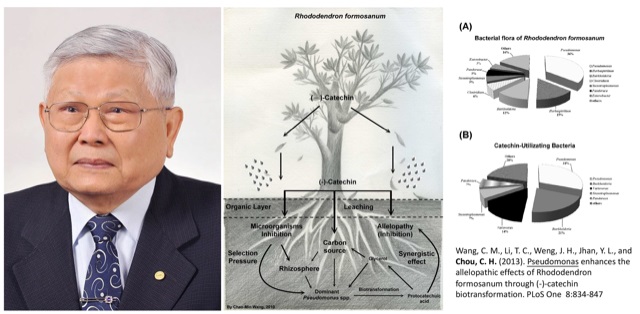[Chang-Hung Chou] A Pioneer of Allelopathy
POST:In the 2021 July issue of Allelopathy Journal, Dr. Chou published a featured article entitled “Pioneers of Allelopathy: XIX. C.H. Chou”, to share his experiences from his personal life, education, to the journey of establishing the allelopathy researches and his enthusiasm in the conservation of ecosystem and the benefit of human being.
Dr. Chou is currently a Corresponding Research Fellow at the Institute of Plant and Microbial Biology (IPMB), Academia Sinica. He was a Research Fellow and served as a Director at IPMB, formerly Institute of Botany, and an Academician of Academia Sinica. Dr. Chou is one of the earliest pioneers and has been devoted to the allelopathy and allelochemicals researches for over 50 years. He started his allelopathy-related research, the phytotoxic substances from sugar cane roots, since he was a master student. He has explored the entire plantation in Taiwan and examined the allelopathic mechanism in nature and agricultural ecosystem, with strong commitment to the development of sustainable agriculture. Dr. Chou’s distinguished scientific achievement has been highly recognized with evidence of receiving numerous academic awards and honors, including the Elected Fellow of The World Academy of Science (1993), Academician of Academia Sinica (1994), and Life Achievement Award by International Allelopathy Foundation (2009).
Allelopathy refers the phenomenon that one organism releases biochemical substances, known as allelochemicals, to the environment, that may have beneficial or detrimental effects to the nearby organisms. The allelochemicals are mainly secondary metabolites with diverse chemical properties, that are released from plants by leaching, root exudation, volatilization, or residue decomposition. Dr. Chou and his co-workers have published >300 research papers, which greatly advanced our understandings on the mechanisms of allelopathy in nature and agroecosystems, and provided new insights for applications to agricultural and medical practice. Below are a few highlights of Dr. Chou’s life-time research achievement.
* Allelopathy in nature and agroecosystems
After survey of the entire plantation in Taiwan, Dr. Chou discovered many important allelopathic tracks and the relevant allelochemicals in natural ecosystem: (1) the dominance phenomenon: some plant species and many grasses had pure stand, and (2) the unique pattern of underneath plant species under the canopy of specific plants, including the unique weed exclusion pattern; relatively lower diversity of underneath species; and the bare area without underneath plants. By combining field, greenhouse and laboratory studies, Dr. Chou and his collaborators concluded that the different plant species produced various allelochemicals, that plays vital roles in the dominance or regulating the canopy weed species. For example, the White Popinac (Leucaena leucocephala) produces the alkaloid named mimosine, which is toxic to many grasses and woody plants to physically compete the growth habitat with other plant species. He also explained the mechanism of pure stand phenomenon of Rhododendron formosanum, which is caused by the interaction between the allelochemical catechin with soil microbes Pseudomonas spp. The soil microbes Pseudomonas spp. transform catechin to protocatechuic acid that shows longer half-life in soil and exhibits greater phytotoxicity to the other plant species, results in the pure stand of R. formosanum.
* Roles of Allelopathy in agroecosystems
One of the major contributions of Dr. Chou is that he uncovered the role of allelopathy in second rice crop planting and the continuous monoculture of crops. He found the autointoxication mechanism results in the reduced yield of the second rice crop. The decomposition of first rice crop in soil releases phytotoxic organic compounds that suppress the growth of second rice seedling. For continuous monoculture of crops, in addition to autointoxication, he found that interaction of allelopathic compounds with soil microorganisms also participates in the enhanced toxicity effect. In addition, Dr. Chou and his colleagues demonstrated the allelopathic effects are enhanced in stressed environment to ensure the survival of the dominant plants.
* The role of Allelopathy in sustainable agriculture
The sustainable agriculture can be achieved by precise agricultural management to reduce the use of synthetic chemicals. Since allelochemicals are natural products that exhibit phytotoxicity, they are suitable substitutes for synthetic herbicides. In addition, in intercropping system where two or more crops are growing subsequently on the same land, the manipulation of allelopathy by choosing proper intercropping plants to maintain soil homeostasis provides a relevant approach in agricultural management.
* Allelochemicals in biomedical research
Besides the applications in the sustainable agriculture, many of the allelochemicals exert anti-diabetic, anti-tumor, anti-oxidative, anti-bacteria, anti-inflammatory activities that may provide the potential to use as the pharmaceutical agents beneficial to human beings.
Dr. Chou also devoted his career in academic service and administrator. Although Dr. Chou already retired from public institution, he continues to devote his enthusiasm in education and science promotion. Dr. Chou’s inspirational and motivational journey of his personal life and scientific career is well deserved for the recognition of Life Time Achievement.
This highlight was written by Dr. Nien-Chen Huang, edited by Dr. Erh-Min Lai, and proofread by Academician Dr. Chang-Hung Chou.
Pioneers of Allelopathy: XIX. C.H. Chou. (2021) Allelopathy Journal 53 (2): 127-152.
